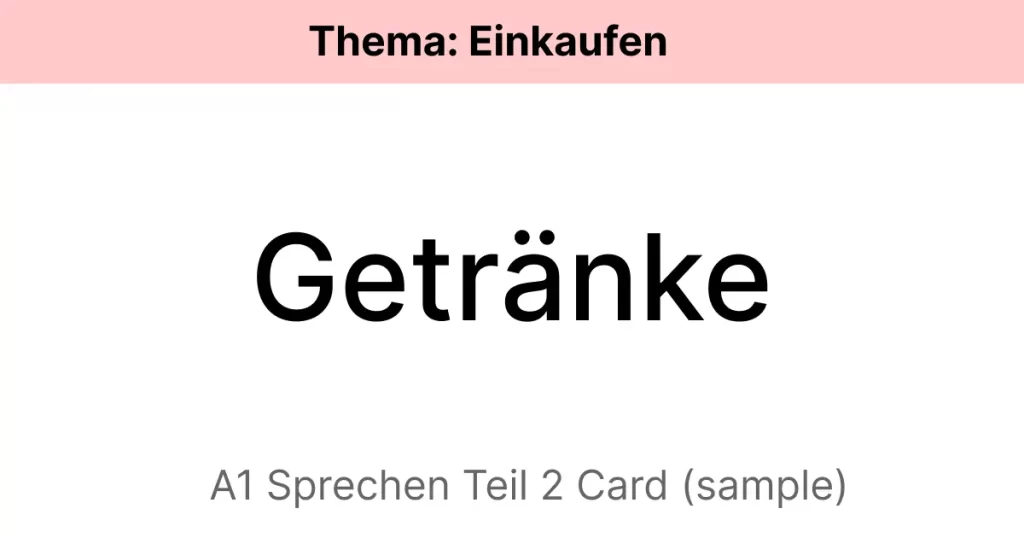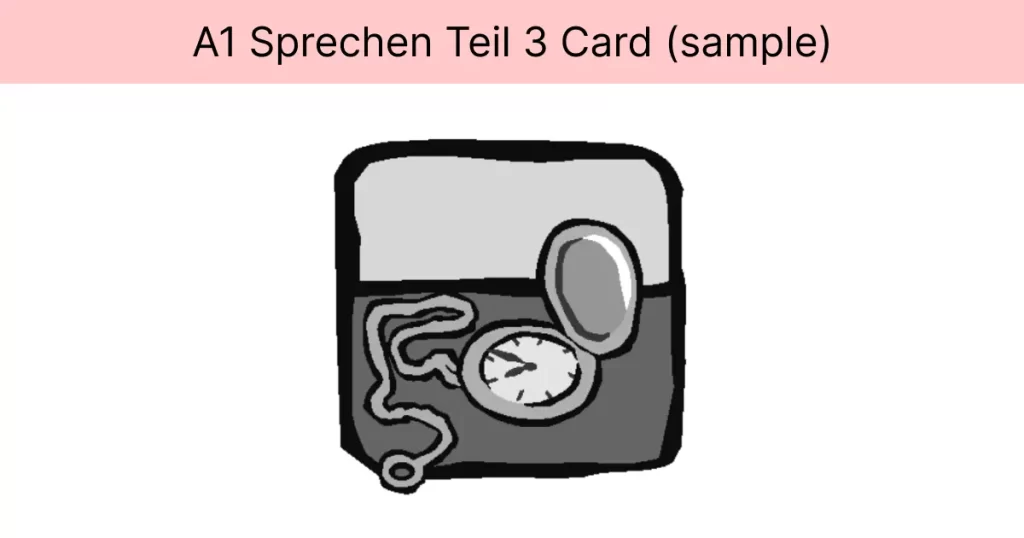In the Goethe A1 sprechen (speaking section), there are 3 parts. Since the students don’t get any preparation time, here are some Goethe A1 sprechen topics with examples.
Practice until you can get the flow, wherein you sound like speaking. Avoid silly mistakes with the articles especially with the Akkusative case.
If you are ready for Goethe A1 exam, here’s everything you need to know about Geothe Zertifikat A1.
Goethe A1 Sprechen Teil 1 Topics
The Goethe A1 Sprechen Teil-1 is about your self-introduction. The introduction should be short, no more than 2 minutes.
Normally, the examiner initiates the conversation with the following phrase,
„Erzählen Sie uns ein bisschen. Wer sind Sie? Hier sind einige Wörter zur Hilfe.”
Translation: (“Tell us a little bit. Who are you? Here are a few words of help.”)
A1 Sprechen Self-intro 1:
Guten Morgen. Mein Vorname ist [ ] . Mein Familienname ist [ ] . Ich bin 22 Jahre alt. Ich komme aus Indien, aus Chennai. Ich bin Student[in]. Ich studiere in Chennai Ingenieurwesen.
Meine Muttersprache ist Tamil. Ich spreche sehr gut Englisch und ein bisschen Deutsch. Meine Hobbys sind Tennis spielen und Briefmarken sammeln.
Note: [in] is for feminine.
A1 Sprechen Self-intro 2:
Guten Tag. Ich heiße [First name, last name]. Ich bin 25 Jahre alt. Ich komme aus Mysore. Ich wohne in Bangalore. Ich bin Informatiker[in]. Meine Muttersprache ist Hindi. Ich lerne jetzt Deutsch. Ich spiele sehr gut Gitarre und höre gern Popmusik.
Once you are done with the self-introduction, the examiner may ask a couple of questions. Usually, you will be asked to spell out any German word such as your city name, your family name etc., and say the numbers in German. For the numbers, you should know how to say your mobile number, zip code, etc.,
Here are some sample questions,
- Buchstabieren Sie Ihren Namen?
- Haben Sie ein Handy? Wie ist Ihre Nummer?
- Wie ist die Postleitzahl?
Goethe A1 Sprechen Teil 2 Topics
The part-2 is a group task. You take a card, which has a theme and a keyword. You should frame a question connecting both the theme and keyword on the card. You should ask your partner and your partner does the same with you on his/her turn.
Goethe A1 Sprechen Teil 2 Themes and keywords
Theme: Wochenende
- Sonntag
- Frühstück
- Sport
- Familie
- Ausflug
- Bücher
Theme: Schule
- Freunde
- Lehrer
- Computer
- Sprachen
- Essen
- Hausaufgaben
Theme: Essen & Trinken
- Frühstück
- Lieblings-essen
- Sonntag
- Bier
- Fleisch
- Brot
Theme: Einkaufen (1)
- Zeitung
- Kasse
- Obst
- Schuhe
- Buch
- Stadtplan
- Wo?
Theme: Einkaufen (2)
- Am Samstag
- Getränke
- Fleisch
- Wo am liebsten?
- Markt
- Gemüse
- Wann?
Theme: Familie
- Eltern
- Geschwister
- Berufe
- Haus
- Wie groß..?
- Wohnung
- Urlaub
Theme: Freizeit
- Wochenende
- Heute Abend
- Lienlings-sport
- Freunde
- Fernsehen
- Hobby
- Wann?
Arbeit & Beruf
- Computer
- Ausland
- Sprache
- Samstag
- Mittag
- Urlaub
- Was?
Theme: Wohnen
- Haus
- Möbel
- Zimmer
- Garten
- Personen
- Stadt
- Balkon

Goethe A1 Sprechen Teil 2 Examples
Example 1:
Theme – Wohnen, Word – Adresse
- Wie ist Ihre Adresse?
- Meine Adresse ist …/ Ich wohne in …
Example 2:
Theme – Freiseit, Word – Fußball
- Wie oft spielen Sie Fußball? / Spielen Sie gern Fußball? / Machen Sie Sport?
- Dreimal pro Woche./ Ja, sehr gerne./ Nein, ich mache keinen Sport.
Example 3 (What NOT to do):
The example 3 is to demonstrate what should NOT be done.
Theme – Einkaufen, Word – Getränke
- Was trinken Sie am liebsten?
The above question is incorrect, as it is NOT related to the theme “Einkaufen“. Though, it is connected to the word “Getränke”, it is not relevant to “Shopping” (einkaufen).
Goethe A1 Sprechen Teil 3 Topics
In the Teil 3, you need to make requests and respond to them, based on the cards chosen by you. The card shows just a picture (no text). You should first recognise the picture and use the appropriate German word to make a request. This is also a group task, wherein you request your partner and your partner does the same.

Goethe A1 Sprechen Teil-3 example
Sie bekommen Karte mit der Uhr. (You got the card with the watch.)
Sie können sagen:
Wie spät ist es bitte?
(You could ask what time is it?).
Die nächste Person beantwortet Ihre Bitte: (The next person responds to your request:)
Es ist 5 nach 12. oder Es tut mir Leid, ich habe keine Uhr.
(It is 5 past 12 or I’m sorry I don’t have a watch.)
Später müssen Sie auf eine andere Bitte reagieren. (Later you must respond to other person’s request)
Goethe A1 Sprechen Teil-3 vocabulary set
- Wohnen (housing)
- Freizeit (hobbies and leisure activities)
- Uhrzeit und Zeitangaben (time, numbers)
- Reisen (travel and transportation)
- Angaben zur Person (to describe people and things)
- Essen und Trinken (food and drinks)
- Lebensmittel einkaufen (shopping, daily activities)
- Post und Bank (basic letters, application, registration)
- Beim Arzt (how do you feel)
- Kleidung (clothing)
- Schule, Arbeit, Beruf (what you do)
In addition, get familiarised with the below vocabularies and phrases.
- German colours & shapes
- Family members in German
- German time phrases & expressions
- German common phrases for beginner
Other useful phrases for Sprechen
Being in the A1 level, it is normal for everyone to misunderstand the questions. So, you can use the below phrases to clarify the questions.
Use the below phrases, if you don’t understand what your partner said.
- Tut mir leid, ich habe dich/Sie nicht verstanden. (I’m sorry, I didn’t understand you)
- Kannst du / Können Sie das bitte wiederholen / noch einmal sagen? (Can you please say that again ?)
Use the phrase below, if you don’t know how to say a word in German.
- Entschuldigung. Wie heißt das Wort… auf Deutsch? (Excuse me. What does the word … mean in German?)
Hope you are better prepared for A1 exam. Here’s the Goethe’s official sample A1 exam. All the very best!
Check out German Classes in Bangalore.

